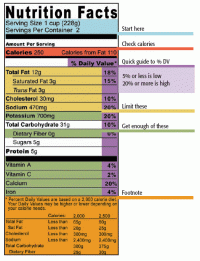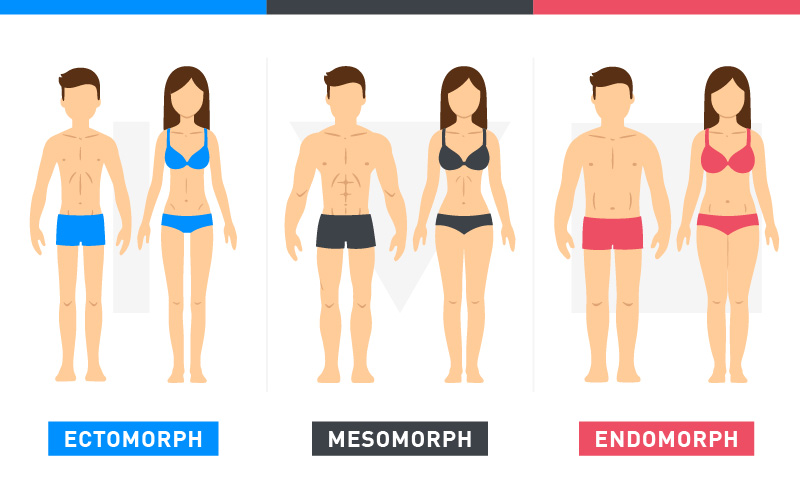Adopting healthy eating habits can be tricky. especially if you have a fast-paced lifestyle. Several foods, including nuts and seeds, are a perfect solution for this. In this article, we will explore how seeds fit into the picture.
Seeds, of any variety, are superfoods, packed with a great amount of wholesome nutrition. The most buzz-worthy ones in the health and wellness industry right now are chia and flax seeds because of their high omega-3 content.
However, there are so many other varieties with amazing nutritional properties that you should be aware of. In the next sections, we will explore nutrients like fiber, protein and vitamins/minerals.
What role can seeds play in a healthy lifestyle?
Seeds are very similar to nuts in their nutritional density. However, they play a much different role in helping someone improve their health. Let’s look at some of the nutrition properties of various kinds of seeds available.
1. Chia
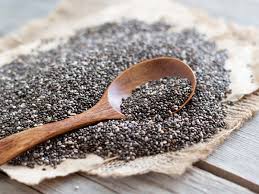
You might recognize chia seeds from the popular 1990s fad chia pet. These seeds were placed on a pot and left to sprout and that gave the pet its grassy hair. Eating chia seeds is a much better choice if you are looking to optimize your health. Here’s what you’ll get in a 2-tablespoon serving (1):
- 137 calories,
- 1 gram of saturated fat,
- 11 grams of fiber,
- 4 grams of protein,
- 177 milligrams of calcium, and
- 4.9 grams of omega-3 fatty acids.
Healthy heart benefits of eating chia seeds
Chia seeds are popular and renowned for their omega-3 fatty acid content. It is recommended that you get a minimum of 250 to 500mg every day (2). One serving of chia seeds gives you 10x that amount!
Studies have shown that regularly eating chia seeds can reduce your risk of a heart attack by 25% (3).
Chia seeds and gut health
In a single serving of these seeds, you get 44% of the 25 grams of fiber you need to get from food sources every day (4). As a result, you’ll prevent yourself from overeating, spiking your blood sugar and move leftover food out of your digestive tract (5), to name a few.
Healing the brain with chia
Let’s go back to the rich omega-3 fatty acid content. There are three sub-types in omega fatty acids, EPA, DHA and DPA. When the brain gets enough omega-3 from the foods you eat, it can better preserve neuronal membranes. That makes it easier for the neurons to function properly, decreasing your risk of degenerative brain conditions like Alzheimer’s Disease (6).
2. Flax
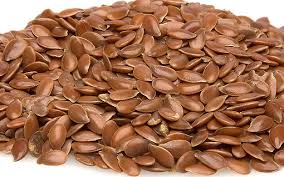
Flax is another popular seed in the health and wellness world. Each time you eat a serving of flax seeds you’ll get (7):
- 150 calories,
- 1 gram of saturated fat,
- 6.3 grams of omega-3 (ALA),
- 8 grams of fiber,
- 6 grams of protein.
Weight loss benefits of flax seeds
One of the star nutrients in flax seeds is its fiber content. Every serving provides 8 of the 25to 30 grams of fiber you need from your food sources each day. Fiber is an important ingredient in any weight loss plan because it fills you up and minimizes the amount of nutritionally empty calories you eat.
The American Heart Association famously conducted a study where 240 volunteers were asked to either follow the organization’s healthy heart protocol or eat 30 grams of fiber each day. The study participants who ate 30 grams of fiber every day lost 5.9 pounds. Compare that to the adherents of the AHA healthy heart protocol, who lost 4.6 pounds (8).
Both results are great, but upping your fiber intake can help you reach your weight loss goals faster!
ALA from flax seeds for less diabetic neuropathy and eased carpal tunnel syndrome
Another great nutrient in flax seeds is the ALA omega-3 fatty acid content. ALA stands for alpha-lipoic acid and it can do a variety of things to optimize your health, thanks to it being water-soluble and fat-soluble. By being able to dissolve in water and fat it can work in every cell of the body.
It can work with the feet, legs, arms and hands to ease the nerve damage that causes peripheral diabetic neuropathy (9).
If you are suffering from carpal tunnel syndrome, getting more ALA can decrease the severity of your symptoms (10).
3. Pumpkin
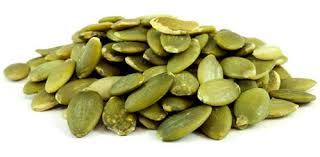
Pumpkin seeds are really only in season in the fall, but it’s good to understand their benefits throughout the year. In a 1-ounce serving you get the following nutrients (11):
- 151 calories
- 1.7 grams of fiber,
- 7 grams of protein,
- 37% RDI of magnesium, and
- 23% RDI of iron.
Health benefits of eating pumpkin seeds
The star nutrient of pumpkin seeds is definitely the magnesium. It is involved in over 300 unique processes throughout the body, so you must do all you can to get the 320 to 420mg you need each day (12). It does everything from maintaining your bone density to controlling muscle contractions to boosting your immune system (13).
4. Sesame
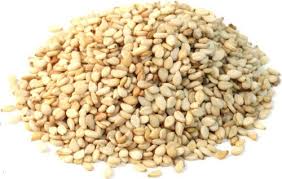
Sesame seeds are often seen on the buns of fast food hamburgers or in Chinese food. These little nuggets are quite the nutritional powerhouse. In a serving size of three tablespoons you’ll get (14,15):
- 156 calories,
- 3.5 grams of fiber,
- 5 grams of protein,
- 22% RDI of calcium,
- 24% RDI of iron,
What health conditions can sesame seeds mitigate?
Anemia affects 3 million people in the United States and iron-deficiency anemia is the most common sub-type (16). This is when your body does not get enough iron each day to carry the oxygen-rich blood to different areas of the body. Consequently, you may feel tired or weak, have shortness of breath, experience dizziness or headaches and even have an irregular heartbeat (17).
Calcium, is another great nutrient to get from sesame seeds. Most people link calcium to great bone density but it has other functions. The brain uses calcium to send messages to different parts of the body. Calcium is also important for blood vessels to move blood throughout your circulatory system (18).
5. Hemp
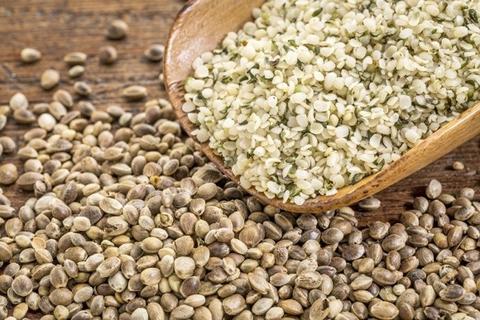
In a typical 1-ounce serving of hemp seeds, you get (19):
- 157 calories,
- 9 grams of protein,
- 12% RDI of iron,
- 47% RDI of phosphorus,
- 23% of copper, and
- 19% of zinc.
How can hemp seeds optimize your health?
The star nutrient in hemp seeds is the phosphorus. Many processes in the body are tied to this mineral. When you get enough phosphorus from the foods you eat, your body can (20):
- Create the adenosine triphosphate or ATP every cell needs for energy,
- Form nucleic acids that help DNA and RNA store and communicate genetic messages, and
- Maintain a healthy acid-base (pH) balance.
One additional takeaway: seeds are packed with fiber!
Did you notice that in almost every variety of seed, there is at least 1 gram of fiber? That is extremely important in a healthy lifestyle. In the next section we will dive into what fiber does to keep you healthy
Why is fiber so important?
Fiber is the most important part of a balanced diet for several reasons, but I’ll only cover a couple of them here:
- It keeps the digestive tract moving and therefore doesn’t allow the toxins in our foods or to be absorbed. It also prevents the toxic waste in our stool from hardening in the intestine, making you sick.
- Eating a good amount of soluble fiber, like the kind in seeds, is linked to a thriving environment to healthy bacteria (21) in the intestines. Studies have shown that between 70 and 80% of our immune system is in our gut (22).
- When your body has enough fiber and can regularly push out the waste it produces, it can focus more on revving up your metabolism and burning excess fat (23).
My final verdict on seeds
These superfoods are an excellent way to start eating a healthier diet and maybe lose a little bit of weight.
Worst case scenario, you’ll improve the amount of fiber in your diet and SAFELY eliminate the toxins it has stored for far too long!

